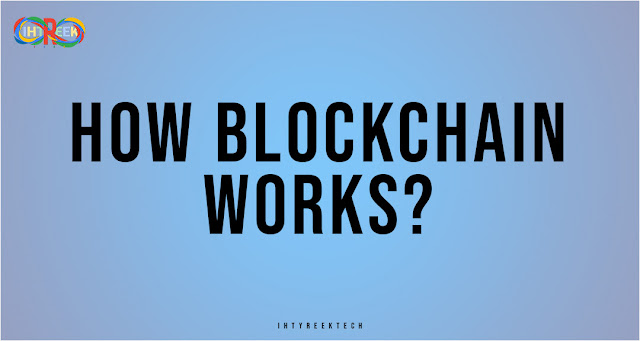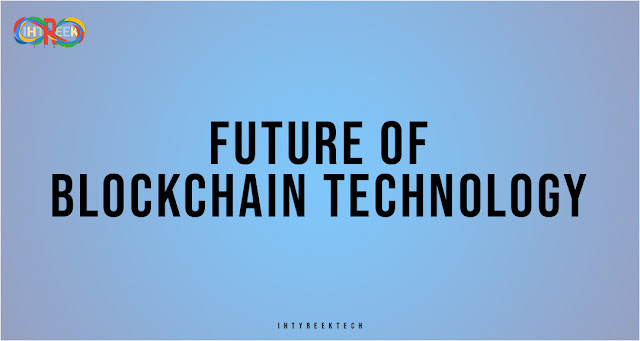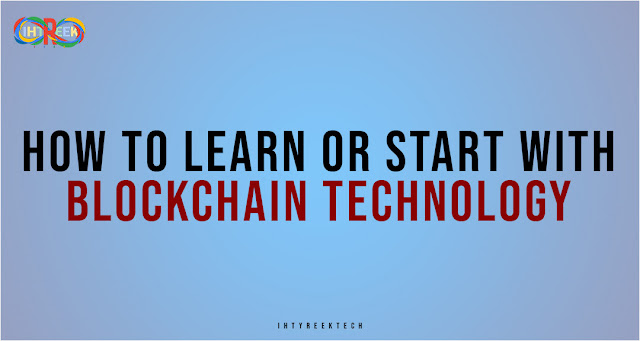Lets go with Introduction about Blockchain Technology
Blockchain Technology is a revolutionary new approach
to storing and sharing data across a decentralized network. It has the
potential to transform many industries and to disrupt the way that we conduct
business, store information, and transfer assets. This article will provide a
comprehensive overview of blockchain technology, including its history,
how it works, its various use cases, and its potential future impact.
History of Blockchain Technology
Blockchain technology was first introduced in 2008 when Satoshi
Nakamoto published a paper outlining a new digital currency called Bitcoin. The
concept of blockchain was introduced as a way to securely store transactions in
a decentralized manner, without the need for a central authority to oversee and
validate them. In the years since its introduction, blockchain technology has
evolved and expanded, with many new applications and use cases emerging.
How Blockchain Technology Works
Blockchain technology is based on a decentralized network
of computers that work together to maintain a shared ledger of
transactions. This ledger is stored on each computer in the network and is
updated in real-time as new transactions are made. The transactions are encrypted
and secured using complex algorithms, making them virtually
impossible to alter or hack. This ensures that the data stored on the
blockchain is secure, transparent, and tamper-proof.
Each block in the blockchain contains a set of transactions,
and once a block is filled, it is added to the chain of blocks, forming a permanent
and unalterable record of the transactions. This creates a chain of blocks,
each containing a historical record of all the transactions that have taken
place on the network.
One of the key benefits of blockchain technology is that it
eliminates the need for a central authority to oversee and validate
transactions. Instead, the network operates on a consensus mechanism, where all
nodes in the network agree on the validity of a transaction before it is added
to the blockchain. This ensures that the network is transparent, trustworthy,
and secure.
Use Cases for Blockchain Technology
The potential use cases for blockchain technology are vast
and far-reaching. Some of the most exciting and innovative applications
include:
- Digital
Currency: Bitcoin, the first application of blockchain technology, was
created as a digital currency. Blockchain technology provides a secure and
transparent way to store and transfer digital assets, making it a natural
fit for digital currencies.
- Supply
Chain Management: Blockchain technology can be used to track the
movement of goods and materials throughout the supply chain. This provides
transparency and accountability, making it easier to detect fraud and to
ensure the quality and safety of goods.
- Identity Management: Blockchain technology can be used to create decentralized systems for identity management. This provides a secure and tamper-proof way to store and manage personal information, making it useful for applications such as voting, medical records, and financial services.
- Digital
Advertising: Blockchain technology can be used to create a
decentralized advertising network, where advertisers can target their
advertisements more effectively, and users can earn rewards for their
engagement with the network.
- Real Estate: Blockchain technology can be used to manage and transfer ownership of real estate assets. This provides a secure and transparent way to track property ownership and transfer of ownership, making it useful for applications such as real estate investment and property management.
Potential Future Impact of Blockchain Technology
Blockchain technology has the potential to transform
many industries and to change the way that we conduct business and store
information. Some of the potential future impacts of blockchain technology
include:
- Decentralization:
Blockchain technology enables the creation of decentralized systems that
eliminate the need for a central authority to oversee and validate
transactions. This has the potential to disrupt traditional business
models and to create new and innovative ways of conducting business.
- Increased
Security and Transparency: The decentralized and secure nature of
blockchain technology makes it ideal for storing and transferring
sensitive information and assets. This increased security and transparency
has the potential to reduce fraud and increase trust in a wide range of
industries, from finance to healthcare.
- More
Efficient Systems: Blockchain technology has the potential to
streamline existing systems and processes, making them more efficient and
cost-effective. For example, the use of blockchain in supply chain
management can reduce the time and resources needed to track and manage
the movement of goods and materials.
- Democratization
of Data: By creating decentralized systems for data storage and
sharing, blockchain technology has the potential to democratize access to
information and to give individuals more control over their personal data.
- New
Business Models and Revenue Streams: Blockchain technology has the
potential to create new business models and revenue streams, by enabling
new and innovative ways of conducting business and exchanging value.
Blockchain technology is still in its early stages and its
full potential is yet to be fully realized. As more organizations and
individuals become familiar with the technology and its capabilities, new use
cases and applications will likely emerge. One of the biggest challenges facing
the widespread adoption of blockchain technology is its scalability. Currently,
the processing capacity of blockchain networks is limited, making it difficult
to handle large amounts of data and transactions. However, ongoing research and
development is aimed at addressing this issue and improving the scalability
of blockchain technology. Another challenge is the lack of standardization and
regulation in the blockchain space. This can make it difficult for
organizations to implement and use blockchain technology, and it can also
create barriers to entry for new entrants.
However, as the technology becomes more widely adopted and
its impact becomes clearer, it is likely that more standardized and regulated
frameworks will emerge. Despite these challenges, the potential benefits of
blockchain technology are significant, and its impact on various industries is
already being felt. As the technology continues to evolve and mature, it is
likely that blockchain technology will play an increasingly important role in
shaping the future of various industries, including finance, healthcare, supply
chain management, and beyond.
In the finance industry, blockchain has the potential
to improve the speed and efficiency of financial transactions, while also
reducing the risk of fraud and increasing transparency. In the healthcare
industry, blockchain could be used to securely store and share medical records,
improving patient privacy and the quality of care. In supply chain
management, blockchain can help increase transparency and efficiency by
tracking the movement of goods and materials in real-time. In addition to these
specific applications, blockchain technology has the potential to create
entirely new business models and revenue streams. For example, decentralized
platforms built on blockchain technology could allow for the creation of new
types of financial instruments and investment opportunities.
Overall, the potential impact of blockchain technology is
far-reaching and cannot be fully predicted at this time. However, as the
technology continues to develop and more organizations and individuals adopt
it, its impact on various industries and on the world at large is likely to
become increasingly significant.
Future of Blockchain Technology
The future of blockchain technology is highly promising and
has the potential to revolutionize many industries and aspects of our lives.
Here are some potential future impacts of blockchain technology:
Decentralized Finance (DeFi) - Blockchain technology
has the potential to disrupt traditional finance by enabling decentralized
financial applications and services. DeFi has already seen tremendous
growth, with many new platforms and protocols emerging in recent years to offer
decentralized lending, borrowing, trading, and insurance.
Supply Chain Management - Blockchain can be used to
track and trace the movement of goods and materials through the supply chain,
from source to end consumer. This can increase transparency, reduce fraud and
counterfeiting, and improve efficiency in the supply chain.
Digital Identity - Blockchain technology can be used
to create decentralized digital identity systems, which can be used to secure
personal data and control access to sensitive information. This has the
potential to give individuals more control over their own data and to increase
privacy and security.
Healthcare - Blockchain technology has the potential to improve healthcare by enabling secure and decentralized medical record-keeping and sharing. This can improve the accuracy of medical records, reduce errors and fraud, and make it easier for patients to access and control their own health data.
Government and Public Services - Blockchain
technology can be used to improve the transparency and efficiency of government
and public services, by enabling secure and decentralized record-keeping,
voting systems, and benefit distribution.
Gaming and Digital Collectibles - Blockchain
technology has already been embraced by the gaming and digital collectibles
industries, with many platforms and games leveraging the security and ownership
benefits of blockchain technology.
These are just a few examples of the many potential
future impacts of blockchain technology. The technology is still in its
early stages, and it's likely that we will see many more innovative and exciting
uses of blockchain in the years to come.
Conclusion
Blockchain technology is a revolutionary new approach
to storing and sharing data across a decentralized network. With its secure and
transparent nature, it has the potential to transform many industries and to
disrupt the way that we conduct business, store information, and transfer
assets. As the technology continues to evolve and expand, its impact and reach
will only continue to grow.
If you're interested in learning about blockchain
technology, here are some steps you can follow:
Start with the basics: Before diving into the
technical details of blockchain, it's important to have a solid understanding
of the basic concepts and principles behind the technology. This includes
understanding the decentralized nature of blockchain, the role of encryption
and cryptography, and the concept of a distributed ledger.
Read introductory materials: There are many
introductory materials available online that can help you gain a solid
foundation in blockchain technology. This can include articles, blog posts, and
introductory books on blockchain.
Take online courses: There are many online courses
and tutorials available that can help you learn about blockchain, including
both free and paid options. Some popular platforms for learning about
blockchain include Coursera, Udemy, and edX.
Join online communities: Joining online communities,
such as forums, social media groups, and online forums, can be a great way to
learn about blockchain and stay up-to-date on the latest developments in the technology.
Attend conferences and events: Attending conferences,
workshops, and events focused on blockchain can be a great way to network with
others in the field and learn from industry experts.
Get hands-on experience: Finally, the best way to
learn about blockchain is to get hands-on experience building and working with
blockchain-based systems. This can include participating in blockchain-related
hackathons, contributing to open-source projects, or building your own
blockchain-based applications.
Learning about blockchain technology can be a challenging
process, but with a commitment to ongoing learning and development, you can
become an expert in the field.
In conclusion, blockchain technology has the
potential to revolutionize many industries and change the way we store,
transfer, and manage data. As the world becomes more interconnected and the
demand for secure and transparent transactions grows, the importance of
blockchain technology will only continue to increase.
By learning about blockchain technology, you can gain
in-demand skills, increase your earning potential, and open up new
opportunities for career advancement and entrepreneurship. Whether you are a
beginner just starting to learn about blockchain or an experienced professional
looking to expand your knowledge, there are many resources available to help
you on your journey.
Message on WhatsApp to get resources to learn blockchain
So if you are interested in exploring the potential of blockchain technology and how it can shape the future, start learning today and be a part of this exciting and rapidly evolving field. Swipe up to see how to learn Blockchain technology. Start now Happy Learning… Ihtreek Tech






